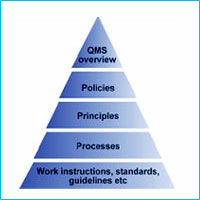ISO 9001:2015 (Quality Management System)
ISO 9001:2015 specifies requirements for a quality management system when an organization:
(a) Needs to demonstrate its ability to consistently provide products and services that meet customer and applicable statutory and regulatory requirements, and
(b) Aims to enhance customer satisfaction through the effective application of the system, including processes for improvement of the system and the assurance of conformity to customer and applicable statutory and regulatory requirements.
- All the requirements of ISO 9001:2015 are generic and are intended to be applicable to any organization, regardless of its type or size, or the products and services it provides.
We offer ISO 9001: 2015 certification that defines good management practices and aims at providing a global standard that spells out quality and trust. Quality management system certification provided by us ensures competitive advantage to the company and helps it to secure future business by identifying areas for improvement. The services offered under this category include:
Our ISO 9001 : 2015 certification is provided to organizations in all areas of work such as manufacturing, processing, servicing, computing, legal and financial services, accounting, etc. To meet the requirements for the ISO 9001:2008 certification, our services also enhance the ability of the company to consistently provide products that meet applicable regulatory requirements and satisfy customer needs.
Why ISO 9001 : 2015 certification?
International acceptance - It is recognized in more than 120 countries and is the logical choice for any organization involved in international business or committed to quality.

Quality management guarantee – It guarantees that the products and services of the organization satisfies the customer's quality requirements and comply with all the regulations applicable to those products or services.
Advantages:
- Enables the suppliers to compete in global market by delivering products that meet international quality standards
- Worldwide compatibility of technology used results in wide choice of offers for customers
- Provide the technological and scientific bases underpinning health, safety and environmental legislation
- Provide developing countries a basis for making the right decisions when investing their scarce resources and thus avoid squandering them
Some other benefits are:
- Reduces cost
- Improves product reliability.
- Better process control and flow.
- Better documentation of the processes.
- Greater employee quality awareness.
- Reductions in product scrap and rejections.
